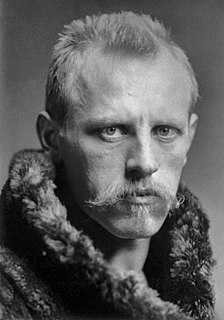A Quote by Dwight D. Eisenhower
It is not a struggle merely of economic theories, or forms of government or of military power. At issue is the true nature of man. Either man is the creature whom the psalmist described as a little lower than the angels ... or man is a soulless, animated machine to be enslaved, used and consumed by the state for its own glorification. It is, therefore, a struggle which goes to the roots of the human spirit, and its shadow falls across the long sweep of man's destiny.
Quote Topics
Across
Angels
Animated
Consumed
Creature
Destiny
Economic
Either
Falls
Forms
Forms Of Government
Glorification
Goes
Government
Human
Human Spirit
Issue
Little
Long
Lower
Machine
Man
Merely
Military
Military Power
Nature
Nature Of Man
Own
Power
Roots
Shadow
Soulless
Spirit
State
Struggle
Sweep
Than
Theories
Therefore
True
True Nature
Used
Which
Whom
Related Quotes
For man holds in his mortal hands the power to abolish all forms of human poverty and all forms of human life. And yet the same revolutionary beliefs for which our forebears fought are still at issue around the globe -- the belief that the rights of man come not from the generosity of the state, but from the hand of God.
The basic struggle today is not between individualism and collectivism, free enterprise and socialism, democracy and dictatorship. These are only the superficial manifestations of a deeper struggle which is moral and spiritual and involves above all else whether man shall exist for the state, or the state for man, and whether freedom is of the spirit or a concession of a materialized society.
A good soldier is a blind, heartless, soulless, murderous machine. He is not a man. His is not a brute, for brutes kill only in self defense. All that is human in him, all that is divine in him, all that constitutes the man has been sworn away when he took the enlistment roll. His mind, his conscience, aye, his very soul, are in the keeping of his officer. No man can fall lower than a soldier-it is a depth beneath which we cannot go.
Man is a machine which reacts blindly to external forces and, this being so, he has no will, and very little control of himself, if any at all. What we have to study, therefore, is not psychology-for that applies only to a developed man-but mechanics. Man is not only a machine but a machine which works very much below the standard it would be capable of maintaining if it were working properly.
The traditional doctrine of man and not the measurement of skulls and footprints is the key for the understanding of that anthropos who, despite the rebellion of Promethean man against Heaven from the period of Renaissance and its aftermath, is still the inner man of every man, the reality which no human being can deny wherever and whenever he lives, the imprint of a theomorphic nature which no historical change and transformation can erase completely from the face of that creature called man.
There are three kinds of nature in man, as Nicetas Stethatos further explains: the carnal man, who wants to live for his own pleasure, even if it harms others; the natural man, who wants to please both himself and others; and the spiritual man, who wants to please only God, even if it harms himself. The first is lower than human nature, the second is normal, the third is above nature; it is life in Christ.
































